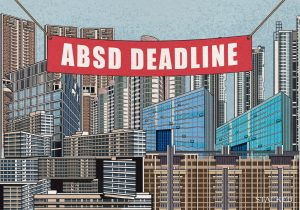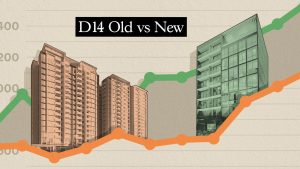When we see stamp duties going up, pulling back from a purchase is normal. But the tricky part is that, when ABSD was first announced, it was labelled as “temporary.” This led to some buyers assuming the policy changes would soon be reversed – so maybe it made sense to wait for that before buying a second property. As it turned out, those who followed this line of thought ended up getting burned – here’s HH’s story about what happened:
Considering a renal asset to supplement retirement
For HH, hesitation wasn’t about market timing or nerves, but government policy. Back in 2014, he was considering the purchase of a second property as part of a retirement plan. His own home was already paid off, and after conversations with a friend and property agent, he was eyeing a two-bedroom unit in the Marine Parade area.
It seemed like a solid choice: the project was near the East Coast Road expatriate enclave, had good rental demand, and was close to an international school.
“The condo was being sold by a foreign couple who were moving back, and we (referring to the agent — Ed.) saw there was good rental demand, and an international school in the area. But I was hesitant to buy because the year before (2013), ABSD had just been increased to seven per cent. So I felt I had time, because I didn’t think property prices could go up so fast anymore. Also at the time, we still believed the cooling measures were temporary. So I would feel like a fool if I pay seven per cent and then next year there’s no more ABSD.”
So when the agent told him someone else had put in a higher offer for the unit, HH shrugged it off and decided it was not meant to be. He was still interested in owning a rental property, but he thought he would do it further down the road, ideally when the cooling measures were lifted.
But as we know, the cooling measures never went away.
Instead, they hardened. By 2018, ABSD rose to 12 per cent. By then, it was clear that ABSD was “temporary” in name only and wouldn’t be reversed. And by the time it reached 20 per cent in April 2023, HH knew he was priced out of the game altogether.
“Now there’s 20 per cent ABSD, and I am already so old, I will just give it up. I think this property door is closed for me. I regret not making my move earlier, but I think it was reasonable to wait given what we knew.”
More from Stacked
The first half of 2025 has been unusual to say the least, and as I write this, we’re just coming…
Ryan J ·
1 Sep 2025 ·
0 comments
HH feels his reasoning at the time wasn’t flawed. The government itself had referred to the measures as temporary in the early years, and prices were softening in 2013–2014. In that context, waiting to see if ABSD would be rolled back seemed prudent.
“Those who chose to wait and see were acting rationally, if you consider that cooling measures were presented as a temporary measure to prevent a bubble.”
(As a point of clarity: the government did call cooling measures temporary in earlier years, but they never specified any timeline for the withdrawal of the measures, not even from the beginning.)
In hindsight, HH sees the irony: the cooling measures worked exactly as intended, reducing demand by discouraging buyers like himself. But they also locked out many who were waiting on the sidelines, expecting a reprieve that never came.
The lesson here is sobering. Policy measures don’t always move in reverse, and if the market adapts to them, they may well become the new normal. By hesitating, HH not only missed out on the property he wanted but also ended up facing an even higher ABSD rate that closed the door entirely.
So far, ABSD rates have only intensified – and you can guess they won’t be rolled back on the basis of price movements
Several realtors noted there’s an easy way to see why ABSD rates probably won’t go away: just look at property prices today. Despite ABSD rates now at 20 per cent, property prices are still rising – even heartland condos can still transact at over $2,000 psf.
Given that a decade of ABSD rates hasn’t slowed the market, imagine how much prices will overheat if ABSD rates are actually withdrawn. Also, given how much prices could shoot up with the unwinding of these measures, it’s possible that just as many people will remain priced out, higher stamp duties or not.
In the end, the safest approach is to lock down the amount you need to safely buy – and then go ahead and do so when you can. Don’t speculate on how policy measures will swing in the future.
For more on the Singapore property market and the experiences of property buyers, follow us on Stacked. If you’d like to get in touch for a more in-depth consultation, you can do so here.

